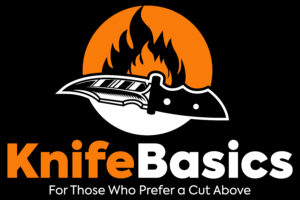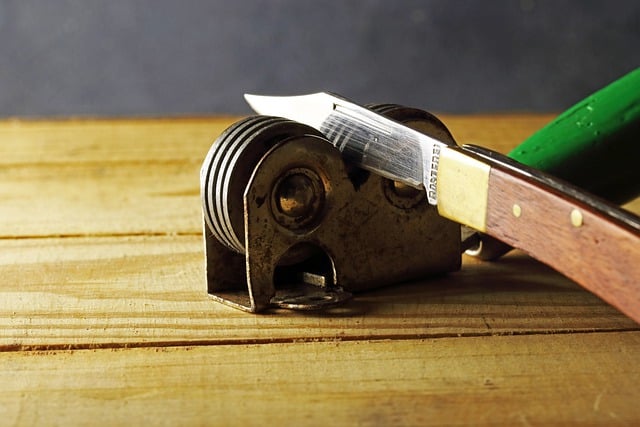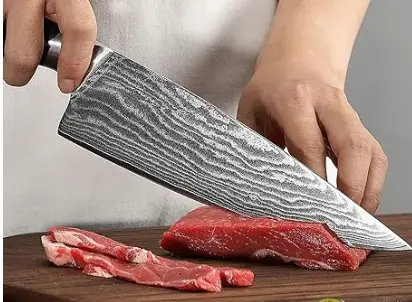Table of Contents
Sleipner steel is tool steel produced by Bohler Uddeholm a famous Austria brand. It is a better version of D2 with improved toughness, edge retention, and hardness.
Due to its improved toughness, the new D2 has become a top choice in the manufacture of cold-work tools. In addition, it is used to make survival, camping, bushcraft knife, pocket knife, chef’s knife EDC knives, and cutters.
What’s more, Sleipner steel is not stainless steel because the chromium in its composition does not meet the required levels to make it stainless steel.
Sleipner steel composition
- Carbon C 0.90%: Increases the edge retention, hardness and tensile strength. It also improves steel resistance to wear, abrasion, and corrosion.
- Chromium Cr 7.80%: Increases hardness, tensile strength, and toughness of the blade.
- Molybdenum Mo 2.50%: It improves machinability and gives Sleipner steel the characteristic air-hardening property.
- Vanadium V 0.50%: Increase wear resistance and toughness, it also improves corrosion resistance. Vanadium acts by improving the grain structure and the carbide structure of the steel.
- Manganese Mn 0.50%: Increases Hardness and brittleness.
- Silicon Si 0.90%: Increases strength and heat resistance.
Sleipner properties
Sleipner Steel Hardness
Sleipner steel hardness is 62-64 as per the Rockwell hardness scale. However, the hardness varies with the heat treatment used by the manufacturer.
Steel types whose hardness goes beyond 60HRC are considered hard steel and this makes our steel of the day very hard steel.
Sleipner attains this high hardness level because of the fine blend of Carbon, Manganese, and Vanadium in its composition, this makes it a good choice for a knife blade.
Sleipner Steel Toughness
If you have been reading about steel properties, you already know that this steel is not tough because it is hard steel. However, Sleipner breaks this steel rule because it offers excellent toughness.
As already mentioned, it is an improvement of D2 and one of the areas of improvement is in toughness to remove the inconvenience of chipping and breaking witnessed in D2.
If you had previously been disappointed by a knife made from D2 in terms of chipping and breaking, try the new version of D2 knives for excellent toughness and strength.
Sleipner Steel Wear resistance
One of the areas where Sleipner naturally benefits from hardness is wear resistance. And for that matter, it exhibits good wear resistance.
This is attributed to the carbon and molybdenum in its composition, giving the steel capabilities to resist shock and last longer.
Sleipner Steel Edge retention
With its hardness, Sleipner steel offers good edge retention. If you are looking for a knife to use outdoor where there are no proper sharpening tools, Sleipner knife varieties make a good choice.
It will take you some time before the need to resharpen knives made from this steel, but do not expect the same edge retention capabilities as with premium steel knives.
Sleipner Steel Corrosion resistance
As already mentioned, Sleipner is not stainless steel, therefore, it scores poorly in corrosion resistance.
However, the low amounts of chromium in its composition give it better corrosion resistance capabilities than many carbon steels out there.
Some brands protect their knives with an anti-corrosion coat. In addition, proper care and storage will keep your Sleipner knives away from rusting.
Ensure to wash, wipe dry and apply a coat of oil to keep corrosion away.
Sharpening Sleipner steel
Another rule of thumb with steel is, the harder it is the more challenging it is to sharpen and this applies with Sleipner knives.
Brace yourself and dedicate enough time to get a sharp edge on this steel.
The good thing about this steel is that it holds an edge for long, so you will not be required to go through the challenging sharpening ordeal frequently.
Sleipner steel equivalents
Sleipner vs D2
As already stated, Sleipner is an improvement of D2 steel, so they differ in chemical composition.
D2 knife steel contains more carbon making it harder and better in edge retention than Sleipner. On the other hand, Sleipner is tougher and easier to sharpen.
Sleipner vs A2 steel
A2 steel offers more hardness, but Sleipner blade steel is better in wear resistance and slightly better in toughness. Both steels offer very little stain resistance and corrosion resistance.
See Also: Niolox Steel Review, An improved tool steel like Sleipner with added Niobium
Is Sleipner steel good for Knives?
The excellent toughness, wear resistance, and edge retention of the Sleipner steel blade make it good steel for knives. However, it is not stainless steel and hence has poor corrosion resistance. This calls for proper care or investment in stainless steel knives varieties with the anticorrosion finish.
Best Sleipner Steel Knife
[affiliatable id=’42798′]


